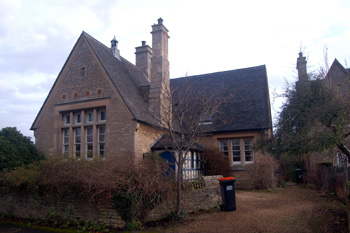
The old school December 2008
The first entry in the first logbook for Stevington British School - 29th February 1864 reads: "School opened today". However, the parish archive for Stevington takes the story back through two years of planning for this day [P71/29 series]. Usually British Schools are seen as nonconformist dominated, as opposed to the Anglican National Schools. That was not the case in Stevington, however. In truth British Schools which were meant to be non-sectarian and were based on the educational principles of Joseph Lancaster. He had himself copied those of Dr. Andrew Bell, in which older children taught their younger fellows.
The parish archive includes a copy letter from the Vicar, Edward Wilson Cook, to the Department of Education in London, written on 15th November 1862 [P71/29/7]. It reads: "I have the honor [sic] to submit to you the inclosed plan of premises proposed for a Mixed School at Stevington. The Trustees will thank you to have the kindness to lay it before the Committee of Council on Education and invite their remarks thereupon".
"It is not designed to make any application for funds toward the building expenses, inasmuch as Crewe Alston Esq of Odell Castle [Lord of the Manor of Stevington] has given the site and His Grace the Duke of Bedford has undertaken the entire cost of erecting the School".
"The managers, however, purposing to put the School under Government Inspection, intend to apply for an annual Grant in aid of current expenses. The names of the first appointed Trustees are the following:
- Crewe Alston esq., Odell Castle;
- Rev. E. W. Cook, Stevington Vicarage;
- Mr. William Pike, Churchwarden;
- Mr. J. C. Robinson, Churchwarden;
- His Grace the Duke if Bedford;
- Hastings Russell, Esq., M. P.;
- Lt. Col. W. B. Higgins, Picts Hill, Turvey;
- Joseph Tucker, Esq., Pavenham Bury;
- Mr. Charles Smith, farmer, Stevington.
Any further information which may be required I shall be happy to furnish".
It is clear from this that the Baptists and Primitive Methodists in Stevington had no say in the initial setting up of the school. The reason for it being a British School is probably the fact that the Duke of Bedford funded the building. It seems to have been his policy to make sure that schools he funded were British Schools, presumably so that the school did not alienate nonconformists who might, thus, keep their children away.
The first meeting of interested parties took place on 28th November 1862 [P71/29/2], Hastings Russell taking the chair. The others present were Lieutenant-Colonel Higgins, the Vicar, the two churchwardens, Joseph Pool and a Mr. Harper. The business included the draft conveyance of the site from Crewe Alston and the naming of the first trustees as noted in the Vicar's letter above.
The site was granted to the trustees on 21st January 1863 [P71/29/1], being described as "measuring thirty six yards on or towards the north-west against the public highway leading from Stevington Village to Stevington Church and thirty four yards on or towards the north-east against other land of me, the said Crewe Alston and thirty six yards on or towards the south-east against other land of me, the said Crewe Alston and thirty four yards on or towards the south-west land of William Saunders".
A very detailed inventory [P71/29/10/1] of furniture needed for the school house came to £28/7/8 and included such items as a pair of brass candlesticks (four shillings), a tea tray (2/6) and a damask quilt (6/6). The estimate notes: "If a Pupil Teacher lives in the House the Cost of Furniture for another Bedroom will be required".
A list of 1863 gives the names of twenty seven people willing to pay fourpence in the pound on rated value to support the school [P71/29/4]. The names are as follows:
- Richard Bowyer;
- Mary Church;
- Edward Wilson Cook;
- Jesse Cowley;
- Robert Cox;
- E. Favell;
- Alexander Field;
- John Fobee;
- Samuel Harker;
- Thomas Harper;
- John Horrell;
- William Hulett;
- William Jones;
- Elizabeth Keech;
- Isaac Keech;
- Isaac William Keech;
- James Keech of West End;
- Thomas Keech;
- John Poole;
- Joseph Pool;
- Thomas Pool;
- James Raban;
- John Ruffhead;
- Thomas Ruffhead;
- James Scrivener;
- J. C. Robinson;
- C. Turney
The School rules were as follows [P71/29/5]:
- Children are admitted into the school from the age of three years.
- One penny for the week must be brought every Monday morning for each Labourer's child [in pencil has been annotated "?others' children reqd to pay 30/- a year"].
- School hours are, in the morning from nine to twelve O'Clock, and in the afternoon from two till four from Michaelmas to Lady day, and from two till a quarter to five from lady day to Michaelmas.
- Children must come to school with clean hands and faces, their hair neat and well combed, and their clothes clean and decently mended.
- No child can attend the school who has any disorder that is infectious, nor whilst the smallpox, measles, hooping [sic] cough, ring-worm, fever, or any other infectious disease prevails in the family.
The parish archive contains a number of bills for establishing the school, including ones for Bibles, other books, slates, chalk, ink and pencils [P71/29/15-16].